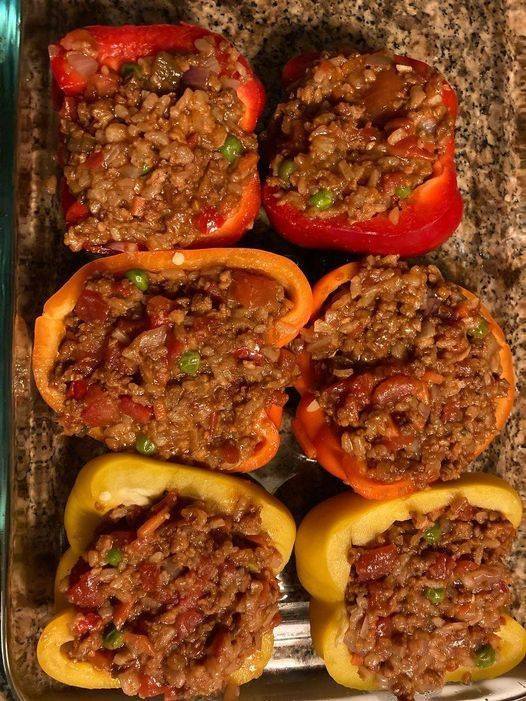Vegan Stuffed Pepper Recipe
Celebrate the vibrant colors and wholesome flavors of fresh bell peppers with this delightful Vegan Stuffed Pepper Recipe. Packed with nutritious ingredients and bursting with savory goodness, these stuffed peppers make for a satisfying and nourishing meal. The combination of protein-rich plant-based fillings, aromatic herbs and spices, and tender peppers creates a dish that is both visually appealing and delicious. Whether you’re a vegan looking for a new recipe or simply seeking a healthy and flavorful option, these stuffed peppers are sure to impress. Get ready to enjoy a delightful symphony of tastes and textures with this plant-powered delight.
Servings: 4 servings
Preheat the oven to 375°F (190°C).
In a large bowl, combine the cooked quinoa, black beans, corn kernels, diced tomatoes, diced onion, minced garlic, ground cumin, smoked paprika, dried oregano, salt, and black pepper. Mix well until all the ingredients are evenly distributed.
Stuff each bell pepper with the quinoa and bean mixture, packing it tightly.
Place the stuffed peppers in a baking dish, standing upright. If needed, you can cut a thin slice from the bottom of each pepper to help them stand more securely.
Cover the baking dish with foil and bake in the preheated oven for approximately 35-40 minutes, or until the peppers are tender.
Remove the foil and continue baking for an additional 5-10 minutes, or until the tops of the peppers are slightly browned.
Once cooked, remove the stuffed peppers from the oven and let them cool for a few minutes.
Serve the vegan stuffed peppers as a satisfying main course, garnishing with chopped fresh cilantro, vegan cheese, or salsa, if desired.
Nutrition Facts per Serving (approximate values):
Calories: 254
Total Fat: 2g
Saturated Fat: 0g
Cholesterol: 0mg
Sodium: 515mg
Total Carbohydrate: 52g
Dietary Fiber: 13g
Sugars: 9g
Protein: 11g
Gut Health:
Plant-based diets are often associated with improved gut health due to the high fiber content from fruits, vegetables, and whole grains. A healthy gut microbiome is linked to better digestion and overall well-being.
Anti-Inflammatory Properties:
Many plant-based foods have anti-inflammatory properties, which can help in reducing inflammation in the body. Chronic inflammation is associated with various health issues, and a vegan diet may contribute to its prevention.
Sports Performance:
Contrary to the misconception that vegan diets lack protein, many successful athletes follow plant-based diets to enhance their performance. Plant-based proteins can support muscle building and recovery.
Reduced Risk of Foodborne Illnesses:
Plant-based diets eliminate the risk of foodborne illnesses associated with the consumption of undercooked or contaminated animal products.
Economic Impact:
A vegan diet can be more economical as plant-based protein sources tend to be cost-effective compared to some animal products. It may be a budget-friendly option for individuals or families.
Mindful Eating:
Adopting a vegan lifestyle often promotes mindful eating. Being more conscious of food choices and sources can lead to a healthier relationship with food and a greater appreciation for the environmental impact of dietary decisions.
Preservation of Biodiversity:
The expansion of animal agriculture often leads to habitat destruction and loss of biodiversity. Choosing a vegan diet supports the preservation of ecosystems and the protection of various species.
Culinary Diversity:
Veganism introduces individuals to a diverse range of cuisines and ingredients from around the world. Exploring plant-based cooking can be a culinary adventure, embracing flavors and techniques from different cultures.
Reduced Antibiotic Resistance:
The use of antibiotics in animal farming contributes to the rise of antibiotic-resistant bacteria. Opting for a vegan diet can be a way to reduce the demand for such practices and promote responsible antibiotic use.
Cruelty-Free Beauty and Personal Care:
Veganism extends to beauty and personal care products. Choosing cruelty-free, vegan alternatives ensures that your lifestyle aligns with ethical choices beyond just dietary preferences.
CONTINUE READING ON THE NEXT PAGE 🥰💕

